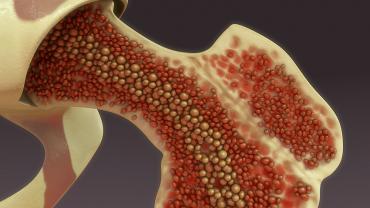
Berberine may be best known for helping to support normal blood glucose and lipid levels. However, emerging research suggests this yellow alkaloid compound extracted from certain herbs, including Berberis aristata, may also benefit several aspects of musculoskeletal health.
According to the World Health Organization, musculoskeletal conditions are the leading contributor to disability worldwide. Although there are more than 150 musculoskeletal problems that may afflict people, some of the most common issues are arthritis and fractures due to fragile bones.
Fortunately, we can manage many of the risk factors for these musculoskeletal challenges, including inadequate physical activity, obesity, smoking, and poor nutrition. In addition, berberine may help promote a healthy inflammatory response and support bone and joint health.
Bone Health and Berberine
Bone fractures are a common result of osteoporosis. This disease is especially a concern for women because they tend to have smaller, thinner bones than men. Although estrogen supports bone health in younger women, levels of this bone-protective hormone plummet at menopause. When estrogen levels decline, the production of pro-inflammatory cytokines increase, leading to increased bone resorption.
Studies suggest berberine could impact various signaling pathways involved in musculoskeletal health and may help prevent bone loss. More specifically, this research includes animal, human, and cell culture studies:
Animal studies — Bone protective properties of berberine have been consistently shown in animal models of osteoporosis that were designed to simulate menopause, aging, or medication side effects. In these studies, berberine inhibited bone resorption and promoted bone mineral density.
Human studies— Two small, 14-week studies of postmenopausal women tested the benefits of berberine, as part of a supplement taken twice daily, which contained berberine (100 mg), vitamin D3 (500 IU), vitamin K1 (500 mcg), and hop rho iso-alpha acids (modified hop extract; 200 mg). Overall, these studies found that the berberine formula improved bone formation compared to a placebo, as assessed by multiple markers of bone remodeling.
Cell culture studies — In vitro studies suggest a berberine derivative can promote osteoblast differentiation, a necessary step in bone formation. Berberine may also inhibit a series of signaling pathways that lead to bone resorption.
Joint Health and Berberine
Joint health can be impaired by osteoarthritis, rheumatoid arthritis, and gout. Osteoarthritis is the most common of these conditions, which erodes the protective cartilage on the ends of bones. The risk of osteoarthritis is increased by several factors, including aging, joint injury, overuse, obesity, weak muscles, genetics, and the female sex.
In contrast, rheumatoid arthritis is an autoimmune condition in which the immune system attacks the synovium that lines the joints. This results in chronic inflammation and pain that can worsen with time.
Orally administered berberine hydrochloride has been tested in animal models of autoimmune arthritis. After rheumatoid arthritis was induced in rats, they were given berberine hydrochloride (200 mg/kg) for 15 days. This attenuated the disease progression and reduced the disease severity by approximately 50%. It also decreased the levels of several serum pro-inflammatory cytokines.
In contrast, the effect of orally administered berberine in osteoarthritis has not been investigated. Rather, the compound has only been tested by injection into animals or in cell studies. This research suggests berberine may help regulate articular cartilage synthesis and breakdown in osteoarthritis.
A preliminary cell study has also been done to explore the potential for berberine to help against gout. This type of arthritis can cause episodes of unbearable pain due to the body’s inflammatory response to deposits of uric acid crystals in joints. When scientists exposed human cells to berberine, it alleviated the inflammation triggered by uric acid crystals.
Investigating Bone Cancer Prevention and Berberine
Scientists are also investigating the potential role of berberine in preventing osteosarcoma, the most common adolescent bone cancer. Osteosarcoma usually starts in osteoblasts. Cell studies suggest that “berberine has a high therapeutic potential against human osteosarcoma cells without affecting the proliferation, differentiation, and function of normal osteoblast cells.”
More specifically, research has shown that berberine significantly inhibited proliferation and induced apoptosis of certain human osteosarcoma cell lines. Scientists have hypothesized that this inhibitory effect may be due, in part, to berberine’s ability to activate the p53 protein, which can induce cell cycle arrest. However, berberine hasn’t been tested in osteosarcoma in vivo. Therefore, its clinical potential in this area is uncertain.
Given the prevalence of arthritis, osteoporosis, and other musculoskeletal concerns, it’s essential to continue exploring potential complementary health approaches such as berberine.
By Marsha McCulloch, MS, RDN, LN